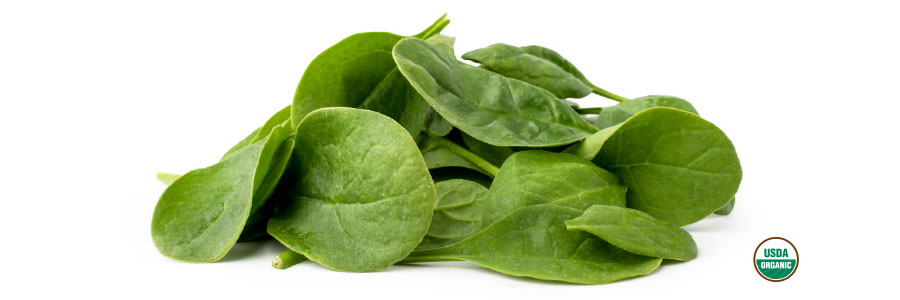


Sign-up for {N}power to get exclusive discounts, newsletters, members-only features, and more!
 Denver - Design District - Alameda and Broadway
Denver - Design District - Alameda and Broadway
368 S Broadway
Denver, CO 80209
United States
 Preferred Store:
Select a Store
Preferred Store:
Select a Store

Unless someone like you cares a whole awful lot, nothing is going to get better. It's not.
– Dr. Seuss, The Lorax

On April 22nd, 1970, a bunch of people like you cared a whole awful lot, and they came together to create what is now the planet’s largest civic affair—Earth Day! 2 Fifty years later, as the devastation of extreme weather events echoes around the world and global carbon emissions have reached an all-time high, going green is more imperative than ever.3 4 5 6 So it’s fitting that our veggie of the month is as green as it gets (literally)—pass the spinach, please!
The chemically dependent approach of conventional agriculture, from petroleum-based fertilizers to synthetic pesticides that are toxic to pollinators, wildlife, and aquatic species, is the opposite of green. And spinach is no exception. Conventionally raised spinach has more pesticide residue by weight than any other kind of produce tested, according to the Environmental Working Group's (EWG) report of USDA testing data. The dismal details include the alarming fact that the neurotoxic insecticide permethrin was found on 76 percent of samples tested.7 The EPA Fact Sheet lists permethrin as “highly toxic to honeybees, as well as other beneficial insects,” and the agency has classified it as “likely to be carcinogenic to humans by the oral route.”8 Europe has banned it for use on food crops, and according to one study, even low-level exposure may double the risk for ADHD in children.9 10
Spinach is one of the most nutritionally valuable veggies on the planet, but not when it comes coated in toxic pesticide residues. If you want to reap the nutritional benefits of spinach, make sure it is organic and you’ll also be helping the bees and other beneficial insects.
When greening up your diet, spinach is one of the most nutrient-dense foods you can choose. Its tender leaves are packed with vitamins, minerals, and antioxidants, providing a range of health-supporting benefits from glowing skin (thanks to vitamins A and C and lutein) to combating oxidative stress and inflammation. Speaking of lutein, spinach is chock full of this carotenoid that has proven benefits for our eyes and brains. It makes up the macular pigment that protects our eyes from the damaging effects of blue light from all of our screen time. It also keeps our brains in tip-top shape, helping them perform better throughout our lives, from infancy to our golden years.11 12 13 14 15 16 Yes, we’ve outgrown Popeye, but spinach still makes you “strong to the finish.”
The official theme of Earth Day 2020 is Climate Action, and with the increasing frequency of drought, fires, and floods, the call to action is loud and clear. It can be overwhelming when so many factors seem out of our control; however, a simple step we can all take to help the environment and help reverse climate change is to start with our daily food choices, and make them organic.



Sign-up for {N}power to get exclusive discounts, newsletters, members-only features, and more!
